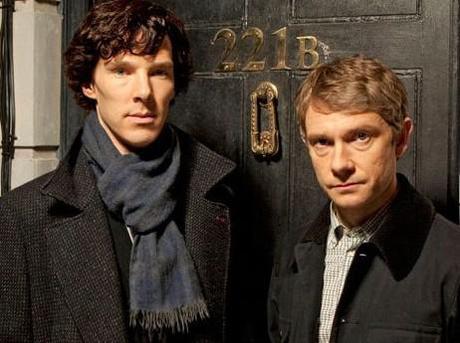
Benedict Cumberbatch as Sherlock Holmes: Brain and brawn?
Sherlock Holmes, Sir Arthur Conan Doyle’s pipe-smoking detective, is with us more than ever these days. There is the BBC adaptation, starring Benedict Cumberbatch; there is the Guy Ritchie film, with Jude Law and Robert Downey Jr; there are countless retellings and continuations, including Anthony Horowitz’s novel, House of Silk.
The BBC episode, “A Scandal in Belgravia,” played this week, was watched by nearly 10 million people, and was a retelling of the Sherlock Holmes story “A Scandal in Bohemia”, in which the detective is outsmarted by Irene Adler. In the TV version, written by Steven Moffat, Adler, who in Doyle is admired for her intellectual prowess, is rendered as a dominatrix who, far from outwitting Holmes, ends by being rescued by him; Holmes, meanwhile, continues his duel with his nemesis, Moriarty.
So why is Holmes so appealing? And why, in particular, is Benedict Cumberbatch drooled over? Cumberbatch has claimed that he suffers from “class-typing”, reported The Daily Mail; because of his background, he’s only given posh roles. Gawker, however, thinks his roles are more to do with his “creepy face”, and suggested that he’d “look heroic in a half-mask.” Other commentators are suggesting that the new version is, in fact, much more regressive than the old stories – making women into emotionally fragile creatures who apparently lack the reasoning power of men.
“I realised from quite early on that, although I wasn’t trying to make a class specialty of it, I was playing slightly asexual, sociopathic intellectuals,” bleated Benedict Cumberbatch, quoted on Gawker.
It’s his cranium, stupid. It’s Holmes’ downright genius that makes him so appealing, said Sarah Crompton in The Daily Telegraph – and Sherlock allows us to see into the workings of his mind in exciting new ways. Plus, “Benedict Cumberbatch is utterly credible as a man who lives entirely in his cerebellum.” The stories arise from “elegant logic”, enticing because of “impossible crimes” solved with “intellectual skills.” And whilst no tribute will ever get the essence of Sherlock, this one is certainly a “joyful celebration.”
“Despite the underappreciated Dr Watson … it is only Holmes who truly makes our hearts beat faster. As the popular Jeremy Brett television series, the steampunk Sherlock Holmes of Robert Downey Jr and the BBC’s 21st century text-messaging Sherlock have shown, Holmes remains a great marketing commodity and a timeless archetype, adaptable to any era,” wrote Michael Dirda in a study of Doyle, quoted on The Daily Telegraph.
It’s not 221B Brokeback Street. And Holmes and Watson, whatever people think, don’t want to “grapple like the cowboys in Brokeback Mountain,” tutted Rowan Pelling, also in The Daily Telegraph. Speculation about their relationship is “tedious” – but what they’re simply doing is enjoying the “beautiful relationship” that can exist between two straight men. The British bromance originates in “boarding school, Oxbridge, military service, the Houses of Parliament and gentlemen’s clubs.” It’s much more about loyalty than lust. And women aren’t put off by these men who don’t flirt – in fact, it’s “life’s greatest challenge.”
“Only in Britain could the resolutely non-smouldering Merlin, Doctor Who, and Sherlock Holmes become national sex symbols,” teased Rowan Pelling in The Daily Telegraph.
But it is downright sexist. This new episode of Sherlock made Jane Clare Jones in The Guardian’s Comment is Free rather worried – “you’ve got to … when a woman comes off worse in 2012 than in 1891.” Irene Adler’s power, in Moffat’s hands, has become sexual rather than intellectual: “less a matter of brains, and more a matter of knowing ‘what men like.’” Holmes has always been about reason over emotion; here Moffat had him sneering at Adler and even saving “the damsel in distress.” It turns out that she didn’t even plot her own plot, but had Moriarty’s help. Politically, this episode was “really quite regressive.”

